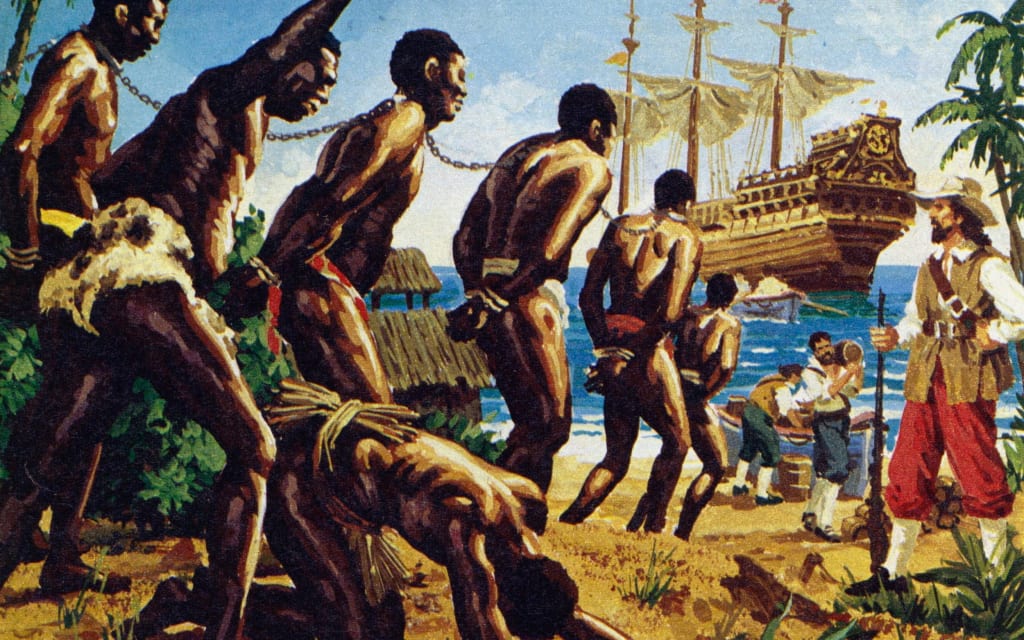African Slave Trade: The Rise, Key Players, and Participants Individuals and Cities
By understanding this historical context, we can gain valuable insights into the impact of slavery on Africa and the global community.

The African slavery trade was a dark period in human history, characterized by the forced transportation and enslavement of millions of Africans. This comprehensive study delves into the factors that led to the rise of slavery in Africa, exploring the socio-economic, political, and cultural dynamics that contributed to this abhorrent practice. Furthermore, it examines the key players and participant individuals and cities that played pivotal roles in perpetuating the transatlantic slave trade.
Table of Contents:
Introduction
1.1 Background
1.2 Objectives
1.3 Methodology
1.4 Scope and Limitations
Historical Context of Slavery in Africa
2.1 Pre-Transatlantic Slave Trade
2.2 Internal Slavery in Africa
2.3 Influence of Arab Slave Trade
2.4 European Contact and the Transatlantic Slave Trade
Factors Contributing to the Rise of Slavery in Africa
3.1 Economic Factors
3.2 Political Factors
3.3 Social and Cultural Factors
3.4 Technological Advancements and Exploration
Key Players in the African Slave Trade
4.1 European Powers
4.1.1 Portugal
4.1.2 Spain
4.1.3 England
4.1.4 France
4.1.5 Netherlands
4.2 African Kingdoms and Empires
4.2.1 Kingdom of Dahomey
4.2.2 Kingdom of Ashanti
4.2.3 Oyo Empire
4.2.4 Kingdom of Kongo
4.2.5 Swahili City-States
Participant Individuals in the African Slave Trade
5.1 European Slave Traders and Merchants
5.1.1 John Hawkins
5.1.2 Bartolomeu Dias
5.1.3 Jean-Baptiste Colbert
5.1.4 Sir John Hawkins
5.1.5 Anthony Johnson
5.2 African Slave Traders and Leaders
5.2.1 Tippu Tip
5.2.2 Queen Nzinga
5.2.3 Almamy Samory Touré
5.2.4 King Jaja of Opobo
5.2.5 Queen Amina
Cities and Ports Involved in the African Slave Trade
6.1 Elmina, Ghana
6.2 Goree Island, Senegal
6.3 Zanzibar, Tanzania
6.4 Luanda, Angola
6.5 Cape Coast, Ghana
Impact of the African Slave Trade
7.1 Economic Consequences
7.2 Sociocultural Implications
7.3 Long-Term Effects
7.4 Resistance and Abolition Movements
Legacy and Lessons Learned
8.1 Reconciliation and Healing
8.2 Commemoration and Remembrance
8.3 Educational Initiatives
8.4 Contemporary Challenges
The African slave trade, also known as the transatlantic slave trade, was a devastating period in history that had profound impacts on Africa and its people. It is essential to understand the factors that led to the rise of slavery in Africa, as well as the key players, individuals, and cities involved in this tragic chapter.
Factors leading to the rise of slavery in Africa:
a. Economic factors: The need for labor in the emerging European colonies, particularly in the Americas, drove the demand for slaves. Plantations and mines required a significant workforce, leading to a massive influx of slaves from Africa.
b. European involvement: European powers, primarily Portugal, Spain, France, Britain, and the Netherlands, played a crucial role in initiating and expanding the slave trade. Their maritime advancements and desire for wealth and resources fueled the demand for African slaves.
c. Inter-tribal conflicts: Internal conflicts and warfare between African kingdoms and tribes created opportunities for capturing and selling prisoners of war as slaves. This practice existed before the arrival of Europeans but intensified with the growing demand.
d. African participation: While the European powers were the driving force behind the transatlantic slave trade, it is important to acknowledge that African individuals, tribes, and states were involved in capturing, enslaving, and selling fellow Africans. Factors such as profit, power, and rivalries contributed to their participation.
Key players and participants in the African slave trade:
a. European powers: European countries established colonies in the Americas, which required a constant supply of enslaved labor. Portugal was the first European nation to engage in the transatlantic slave trade, followed by Spain, France, Britain, and the Netherlands. These nations built forts and trading posts along the African coast to facilitate the exchange of goods, including slaves.
b. African slave traders: African individuals, tribes, and states played a significant role in capturing and selling slaves. Some notable African kingdoms involved in the slave trade were the Kingdom of Dahomey (present-day Benin), the Ashanti Empire (present-day Ghana), and the Oyo Empire (present-day Nigeria). These African actors often collaborated with European slavers or acted as intermediaries in the trade.
c. African coastal cities: Several African cities became major hubs for the slave trade. These cities served as crucial trading centers where European slavers and African traders met. Examples include Elmina and Cape Coast (Ghana), Ouidah (Benin), Luanda (Angola), and Lagos (Nigeria).
d. European slavers and merchants: European individuals and companies participated in the slave trade by financing, equipping, and operating slave ships. Some prominent figures involved were British merchants, such as John Hawkins and the Royal African Company, as well as French and Portuguese slavers.
It is important to note that the African slave trade had devastating consequences for the continent, leading to the loss of millions of lives, disrupted societies, and long-lasting impacts on African development.
Acknowledging this dark period in history allows us to reflect on its lasting legacy and work towards promoting understanding, equality, and justice for all people, irrespective of their historical background or origin.
About the Creator
ONYIGOD WRITES
ONYIGOD WRITES is a leading Writer house committed to revolutionizing the literary landscape. With a stories spanning over the World. Join us on this remarkable journey of storytelling, where imagination knows no limits.






Comments (1)
Thanks For Reading and Wishes to Always bring the Best News and Information Across........Please Like, share and don't forget to tell me in the comment section What your Opinion is about what You just read. I'm open to your Opinion